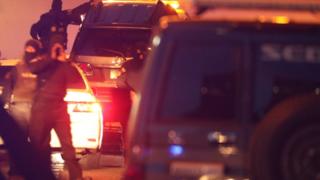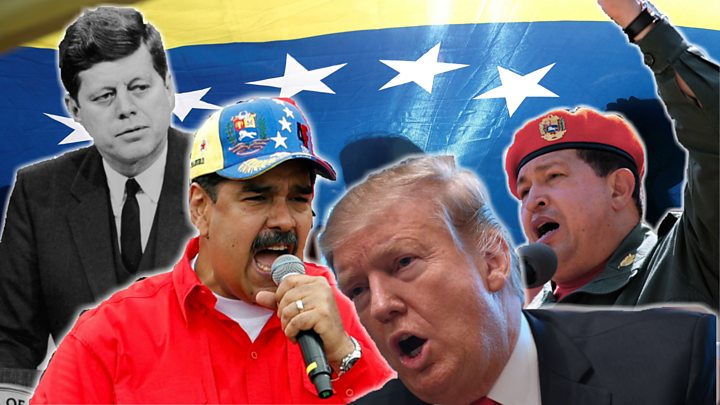Home » Latin America »
Guaidó deputy detained in Venezuela
Venezuelan opposition leader Juan Guaidó’s deputy has been detained by the country’s intelligence services.
Edgar Zambrano, vice president of the National Assembly, refused to leave his car when approached, and as a result he and his car were towed to prison.
It is the first arrest of an opposition figure since attempts to spark a military rebellion against President Nicolás Maduro last week.
Mr Guaidó is recognised as “interim president” by more than 50 nations.
Democratic Action party leader Carlos Prosperi told reporters that he had been at a party meeting with Mr Zambrano in the capital Caracas moments before he was arrested by agents from Venezuela’s Bolivarian Intelligence Service (Sebin).
“The vehicle was surrounded,” he said. “They [Sebin agents] wouldn’t allow us to get to him. They brought a tow truck and his vehicle was towed away.”
He added that they believe he was taken to El Helicoide, a notorious prison in the centre of the city.
“We don’t know anything about what physical condition he’s in and we don’t know what is happening at El Helicoide at the moment,” Mr Prosperi said.
Mr Guaidó also tweeted about the arrest, calling Mr Zambrano’s arrest – in particular, the towing of his car – “absurd”.
La dictadura ha secuestrado al Vicepresidente de la @AsambleaVE a manos de su policía política. Llegaron al absurdo de llevárselo en una grúa, a bordo de su vehículo, violando todos los procesos y exhibiendo el autoritarismo al cual obedecen.
End of Twitter post by @jguaido
The arrest comes one day after Venezuela’s Supreme Court ordered that Mr Zambrano and six other National Assembly deputies be charged with treason for their alleged participation in the failed military uprising.
“One of the principal conspirators of the coup has just been arrested,” Diosdado Cabello, head of the pro-Maduro Constituent Assembly, told state TV. “They will have to pay before the courts for the failed coup that they have attempted.”
What has happened since last week’s clashes?
On 1 May, both pro and anti-government supporters held demonstrations in Caracas which were initially peaceful.
But there were soon reports of gunfire in the city, and a local NGO, the Venezuelan Observatory of Social Conflict, said Jurubith Rausseo, 27, had been shot dead during a rally in the opposition stronghold of Altamira.
On Tuesday, Mr Guaidó declared what he called the “final phase” of the operation to topple Mr Maduro. He posted a video of him with a number of men in uniform and said he had the support of “brave soldiers” in Caracas.
He urged Venezuelans to join them on the streets, and appeared alongside another opposition leader, Leopoldo López, who had been under house arrest after being found guilty of inciting violence during protests in 2014.
Four people died in the clashes, including two teenagers, and another 46 people were injured.
Mr Guaidó declared himself Venezuela’s interim leader in January. As the head of the opposition-controlled National Assembly, he invoked the constitution to assume an interim presidency, arguing that Mr Maduro’s re-election last year was illegitimate.
The opposition leader, who is president of the National Assembly, has the support of more than 50 countries, including the US, UK and most Latin American nations.
On Sunday, he told the BBC that he would consider asking the US to stage a military intervention.
But Mr Maduro – who is backed by Russia, China and the leaders of Venezuela’s military – has refused to cede power.
Source: Read Full Article




